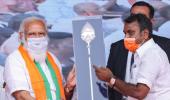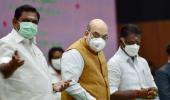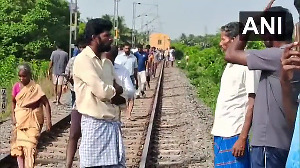'A recent compromise by the state government is accepting NEET exams for medical entrance.'

The absence of stalwarts M Karunanidhi of the Dravida Munnetra Kazhagam and J Jayalalithaa from the All India Anna Dravida Munnetra Kazhagam has meant that the two major political parties vying to come to power in the April 6 Tamil Nadu election have to rely on personalities and more on programmes.
The towering presence of these titans had so altered the state’s political landscape that it is hard to imagine what politics would be without them.
Charisma and personal appeal were what kept the Tamil political scene going, which is a tragedy since the Dravida movement which spawned these two political parties that have ruled the state between them since 1967 replaced the Congress in Tamil Nadu on the basis of its social justice programmes.
Associate professor C Lakshmanan of the Madras Institute of Development Studies, who holds a doctorate for his thesis on 'Personality cult in Tamil Nadu politics: A study of the culture of Dravidian parties', from Jawaharlal Nehru University, tells A Ganesh Nadar/Rediff.com, "There are no cult figures in politics now."
How did the Dravidian parties come to be associated with the personality cult? Be it Karunanidhi, or MGR and Jayalalithaa, somehow the image seems to have dominated the message?
The cult formation takes place through the party mouthpiece and mass media, particularly through popular culture. Cinema played a major role in this cult formation.
Those days cinema, print media and party mouthpiece built a hyperbole over small things by exaggerating them. Literate, semi-literate and illiterate got carried away by this larger than life size image creation.
This is directly opposed to their own rationality principle.
Do you see a lessening of the personality cult now, with the passing of an era in Karunanidhi and Jayalalithaa?
Yes. To some extent, Jayalalithaa, M Karunanidhi and MGR had unique qualities.
M Karunanidhi was a great orator and writer, MGR was a charming, attractive and fair persona. Jayalalithaa had her own persona and also she was closely associated with MGR. She was considered MGR's heir.
There are no cult figures in politics now. Cult orientation is declining now. You must keep in mind that cult itself is not natural, it may be constructed in the future if they have any special quality or skill and also charisma.
With a new generation leading the main Tamil Nadu political parties, can we say that the film industry's influence over the state's politics has ended, or at least reduced?
Influence of films in the political arena continues to play some role. It is not completely transcended because Vijayakanth, Kamal Haasan, Sharath Kumar, Seeman, Khushbu and Udhaynidhi Stalin are playing a major role in electoral mobilisation.
They tried to bring in Rajinikanth, but he took a matured decision not to enter politics while acting. He saved himself from politics. That was a very mature decision which I appreciate.
How have the Dravidian parties evolved/changed in this period? Do you think they have lived up to their early promise?
No. They have not lived up to what they promised ideologically or even otherwise. They have not been able to differentiate between anti-Brahmin politics and anti-caste politics.
It requires a different political strategy all together for anti-caste politics.
The rationality creed of the Dravidian parties sets them apart from other political parties. How has this ideology changed?
The party has compromised since they decided to contest elections in the 1960s. They have compromised ideology, and then they left their separatist demand which is a good thing. The issue of religious belief or belief in God, (Dravida Kazagham founder E V Ramaswamy Naicker) Periyar was an atheist, but the DMK says they believe in one god and one community, which god they don't specify. It is a compromise on their atheist philosophy.
They have constantly compromised on state autonomy and the language policy. They allow Hindi to be taught in private schools, but they are depriving government school children. The school children should have an option.
Both Dravidian parties have compromised on many issues; a recent compromise by the state government is accepting NEET exams for medical entrance.
How do you look back at 50 years of Dravidian parties' rule over Tamil Nadu, something that has not happened in any other state?
 There are positives and there are negatives. The positive is that Tamil Nadu has achieved human development indicators that are better than the north Indian states. We can see that in the fields of health, education, infrastructure, roads, water and electricity.
There are positives and there are negatives. The positive is that Tamil Nadu has achieved human development indicators that are better than the north Indian states. We can see that in the fields of health, education, infrastructure, roads, water and electricity.
The foundation was laid by the Congress Chief Minister K Kamaraj, the Dravidian parties followed suit. Now everyone wants to imitate Kamaraj rule and not Dravidian rule.
On the negative side -- the core of Dravidian ideology is to lessen caste-based discrimination, violence and atrocities. It has utterly failed in this aspect, ie, protecting the Dalits and the Adivasis.
In Vaachathi, Adivasis were attacked by the police in the nineties. Every decade or half a decade, violence has been orchestrated against Dalits.
The fruits of Dravidian politics have not benefitted Dalits and Adivasis. It has overwhelmingly benefitted or cornered by non-Brahmin upper caste and intermediate middle castes (OBCs).
In the state that spearheaded anti-Brahmin politics 50 years back, now anti-Dalit politics is being practised overtly and covertly.
Why is that the middle castes have consolidated themselves politically, while the lower castes have failed to do so, given their influential numbers in the state?
Caste in a very complex institution, it differs from region to region and state to state. In the case of Tamil Nadu, caste has been looked at by the Dravidian parties as Brahmin and non-Brahmin, upper and lower, which glosses over the abject conditions of the caste system.
This is because the Dravidian parties are for non-Brahmin upper castes and middle castes -- not for the Dalits, Adivasis or other lower castes.
Caste system is not a binary structure. It is multi-layered and graded in an unequal structure. Therefore, what I describe in short is theoretically anti-Brahmin and concretely anti-Dalit.
That is why the lower castes have not been able to consolidate themselves and are unable to take their legitimate share in the state economy and benefit from the development ushered by Dravidian politics.
How did the freebie culture enter and dominate Tamil Nadu's politics?<
What has been the impact on the state's economy?
The freebie culture has depoliticised the politics of the downtrodden, marginalised and oppressed. It started in 1967 when they promised three kilos of rice for one rupee. It was unrealistic and not implemented. Land reform was a political programme that was not part of Dravidian politics.
Free cycles, mixies, grinders, TVs were given and now they have promised more. The poor have never asked for all these things. They have asked for better wages, better schools, better infrastructure such as toilets and hostels.
These are the legitimate demands of the people. This is actual welfare politics. Instead of this, they are giving freebies with the aim of depoliticisation.
They are not bothered about the state's economy; they are not concerned about the people's legitimate rights. Waiving off loans without substantial scrutiny shows that Dalits and Adivasis have hardly benefitted from these loan wavers.
Fan clubs were once the backbone of Tamil Nadu's political parties. Do you think their dominance over his thinking is what led to superstar Rajnikanth backing out of politics?
The fan clubs were once major influences in the DMK and a precursor to the AIADMK. MGR's success in politics was not credited only to his fan clubs, but also his ideological politics, which came across from his association with the DK (Dravida Kazagham) and DMK.
Rajnikanth backed out from politics because he has no association with any political party in the state. He has always concentrated on his films. He did not concentrate on image building through cinema like MGR. From the beginning he has been disassociated with party politics.
He himself admits that his personality is not suitable for electoral politics. He did not want to be a puppet for someone else.
After a long time we are seeing a top cine idol in Kamal Haasan in politics. How do you see his trajectory?
One has to wait and see. He is not consistent in his political approach or basic principles. He is not coherent about any policy. He does not have any concrete programmes.











